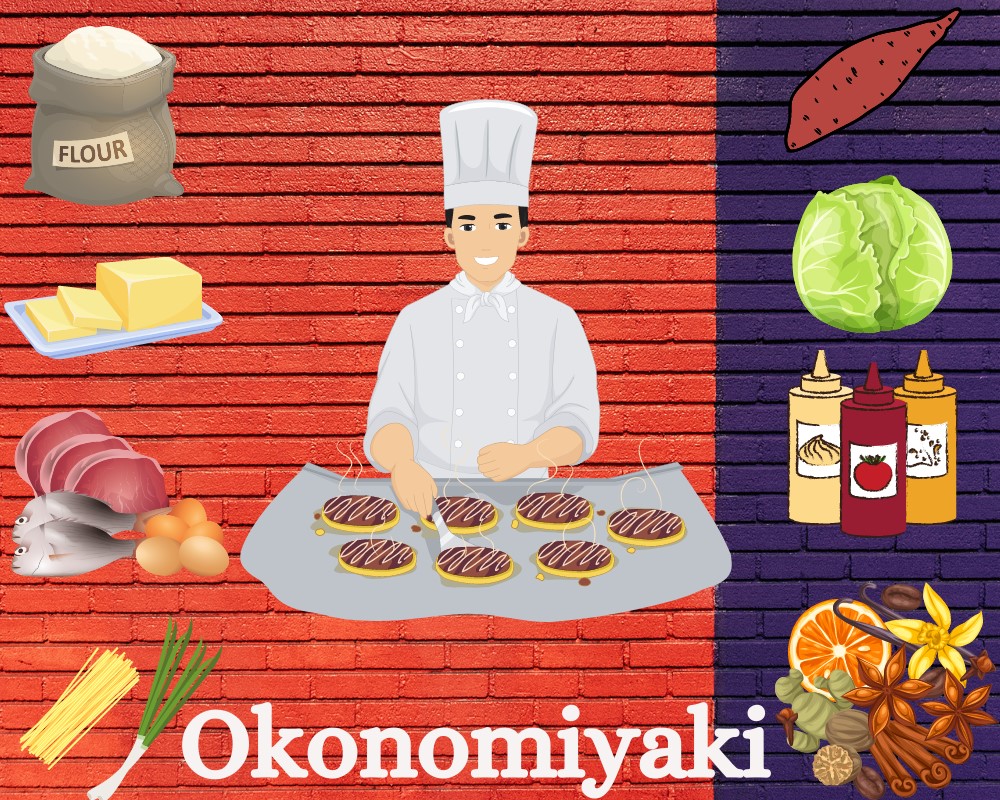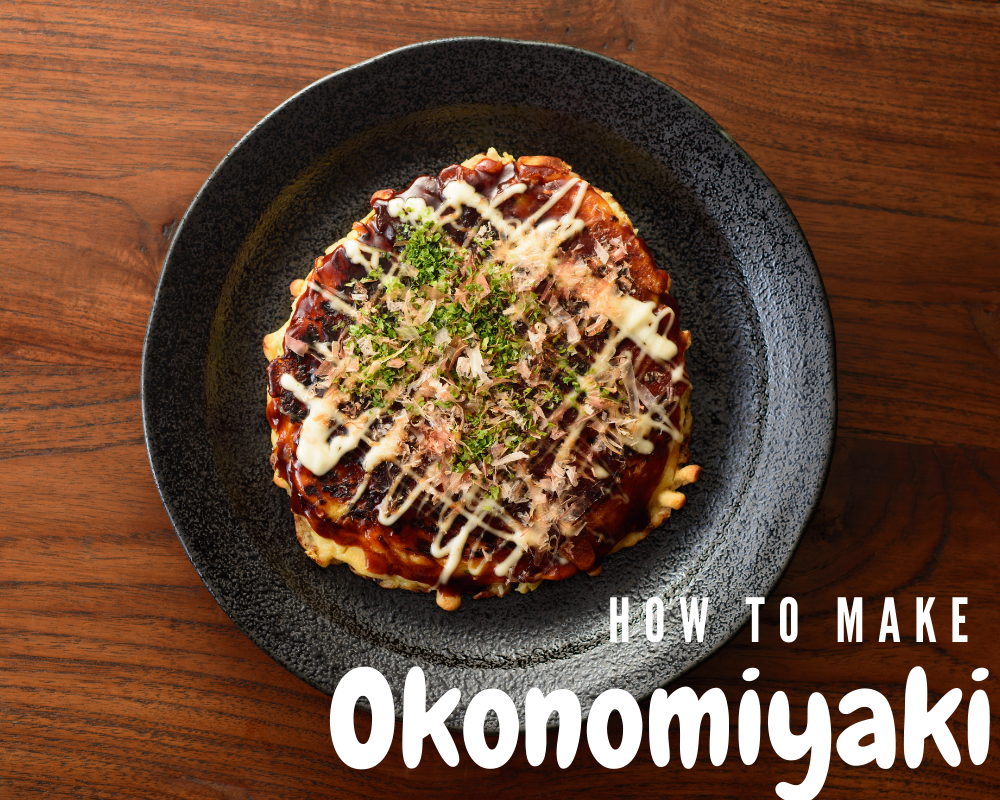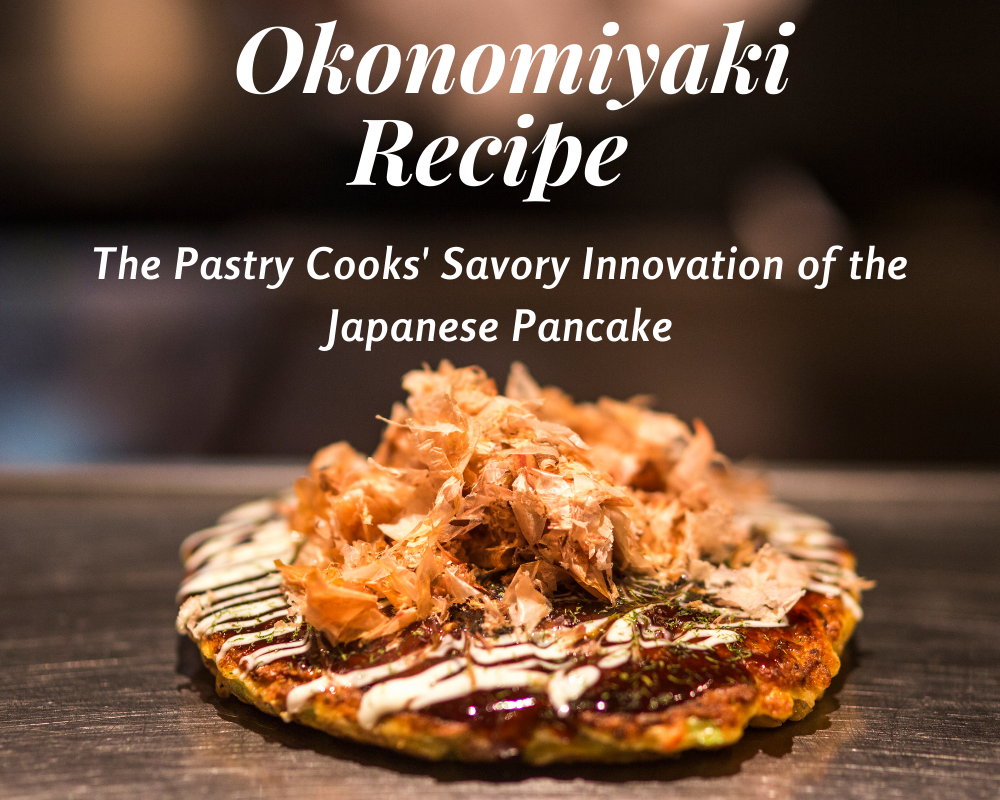Is it boring to eat sweet pancakes all the time? How about trying savoury pancakes? From my perspective, it’s a definite YES. Let’s try out the Japanese popular street food named Okonomiyaki. No worries! If you don’t live in Japan, you can still taste the original okonomiyaki at your home. The simple solution is to cook hygienically yourself and we’ll disclose the pastry chef’s secret okonomiyaki recipe for you.
As the term okonomi means “as you like” and yaki means grill, you can cook these Japanese pancakes however you like. In a nutshell, besides the basic ingredients for okonomiyaki batter and okonomiyaki sauce, you can add all your favorite ingredients. Just Cook Okonomi!
What is Okonomiyaki?
Okonomiyaki is a popular Japanese street food. This Japanese pancake finds its origin in Osaka where it was first introduced at a shop in the 1930s. It can be described as a fluffy and savoury version of thin crepes known as funyaki. Okonomiyaki is made with okonomiyaki flour folded with fluffy eggs, assorted vegetables, proteins and drizzled with tangy condiments and sauces. Follow our secret okonomiyaki recipe, cook it like a Pro and tantalize your taste buds with scrumptious Japanese pancake okonomiyaki.
Regional Styles of Okonomiyaki Recipe
Though okonomiyaki is originally a dish of Osaka, many regions of Japan cook it in their own style. While following the basic recipe, these pastry chefs only customize the filling ingredients to make them taste their own. You can note down the following okonomiyaki recipe and can adjust the add ons according to the style you want.
Hiroshima-style okonomiyaki
Hiroshima cooks make okonomiyaki in a style they use to make pizza i.e the layering method. They first put some okonomiyaki batter on a hot plate or grill. Then, they add cabbage, proteins of their choice, sprinkle herbs, and drizzle okonomiyaki sauce. By this layering method they usually make Japanese cabbage pancakes.
Modan-yaki
The modan-yaki version of okonomiyaki says “the more, the merrier.” Rather than following just a simple okonomiyaki recipe, they prepare tasty additions. For example, Japanese stir fried noodles (Yakisoba) or udon noodles, which usually go on top of okonomiyaki.
Monjayaki
Monjayaki okonomiyaki is a popular street food throughout Tokyo where it is famously known as monja. It’s indeed a thin, stretchy, and softer version of the original okonomiyaki. The secret behind this heavenly creamy texture is an extra amount of dashi added to the batter. Moreover, the cheesy okonomiyaki are fried in a pan that gives them a golden caramelization on top.
Negiyaki
Negiyaki is more like a Chinese pancake sprinkled generously with green onions and chives. Sometimes, the pancake is topped with a half fried egg and dressed up with a lot of aromatic scallions. Moreover, these are thinner and crispier than the original Japanese pancake okonomiyaki.
Osaka-style okonomiyaki
It’s in fact the original okonomiyaki recipe. It includes a soft and fluffy okonomiyaki batter, mixed all together with veggies, proteins, and drizzled with salivary okonomiyaki sauce. Here, you can use vegetables, proteins, herbs, and spices according to your taste preference.
Basic Okonomiyaki Ingredients You Will Need:
No matter what style of okonomiyaki you are going to cook, the following are the basic ingredients you will always need. You can buy all these Japanese pancake okonomiyaki ingredients at any Asian grocery store. Moreover, you can also order them online from a reliable Japanese online retailer or from Amazon.

Okonomiyaki Flour
It’s a special flour that is made with unbleached and organic soy and wheat flour. Okonomiyaki flour does not require you to add extra ingredients to make the pancakes fluffier and thicker. In addition, it is beautifully combined with balanced condiments to make the pancakes taste delicious. If you do not have okonomiyaki flour then, you can use all purpose flour. However, you must add some dough softener, activator or riser, yam or potato starch, and some herbs and spices.
Nagaimo (The Japanese Yam)
The key ingredient of okonomiyaki recipe is the Japanese Yam known as Nagaimo. One can also use yamaimo (mountain Yam) if nagaimo is not available. It is the yam that gives okonomiyaki the fluffy, soft, and creamy texture. Moreover, the slimy sticky juice that comes out when you grate the Japanese yam can cause allergies. Therefore, you should use kitchen gloves while peeling and grating yam for the okonomiyaki recipe. Buy the fresh and supreme quality Nagaimo at any Asian grocery store.
Katsuobushi (Dried Bonito Flakes)
Katsuobushi is the dried, thin, and crispy flakes of fermented and charred bonito fish. It is a great ingredient that gives Japanese dishes an ultimate umami flavor. Katsuobushi is also used to make dashi (the Japanese stock that we use for miso soup) we add in the okonomiyaki batter. Moreover, these super delicious dried bonito flakes are sprinkled on top of soft pancakes to create textures in the dish. However, it’s not a must-have okonomiyaki ingredient, you can eliminate it if you don’t want a fishy flavor.
Tenkasu (Tempura bits)
Tenkasu is not a healthy ingredient and many people wish to omit it. Nevertheless, according to the Osaka cooks, it’s an important ingredient to make soft and fluffy okonomiyaki. A great DIY hack to replace tempura bits is to use the leftover okonomiyaki batter. All you need is to drizzle the drops of remaining batter in hot oil and let them fry to golden-brown. Moreover, you can also try dried and crispy shrimp crisps as a substitute for tempura bits.
Okonomiyaki Sauce
Is it possible to make a Japanese pancake recipe without okonomiyaki sauce? Definitely, not. You cannot enjoy okonomiyaki pancakes without a generous drizzle of okonomiyaki sauce. There are many commercial brands that are manufacturing delicious okonomiyaki sauces. Nevertheless, if you are concerned about health and hygiene, you can make it yourself. Read the following best okonomiyaki sauce recipe.
Japanese Mayonnaise
Japanese mayonnaise along with okonomiyaki sauce makes a tangy and creamy sauce that goes heavenly with soft pancakes. Other mayonnaise i.e. American mayonnaise cannot give that particular flavor. Therefore, shop for a bottle of Japanese mayo from any Asian grocery store or from Amazon. Use it for many Japanese dishes.
Aonori (Seaweed)
Aonori is a deep green dried seaweed powder. It’s the best source to give umami rich flavor to your Japanese pancake okonomiyaki. Japanese use various types of seaweed for their particular Japanese dishes. Just like kombu is used for sushi rice, nori for miso soup, aonori is particularly used for okonomiyaki.
How To Make Okonomiyaki?

Okonomiyaki Ingredients
Okonomiyaki Batter Ingredients:
| Ingredients | Measurement |
| Okonomiyaki Flour (or all purpose flour) | 1 cup |
| Large eggs | 4 |
| Tenkasu (tempura bits) | ½ cup |
| Kosher salt | ¼ teaspoon |
| Sugar | ¼ teaspoon |
| Baking powder | ¼ teaspoon |
| Nagaimo | 0.15 kilograms |
| Dashi ( japanese stock) | ¾ cup |
| Pickled red ginger | ¼ cup |
Filling and Layering Ingredients:
| Cabbage | 1 large |
| Pork belly | ½ lbs sliced |
| Vegetable oil | As needed |
For Okonomiyaki sauce:
| Worcestershire sauce | 3 ½ tablespoon |
| Oyster sauce | 2 tablespoon |
| Ketchup | 4 tablespoon |
| Sugar | 1 ½ tablespoon |
Classic Okonomiyaki Toppings You May Need
- Japanese mayonnaise
- Okonomiyaki sauce
- Katsuobushi
- Aonori
- Green onions
- Pickled red ginger
- Ham slices
- Yakisoba Noodles
- Half fried Egg
- Dried Oregano
- Melted Cheese
- Cream Cheese
Time-Tested Okonomiyaki Recipe and Instructions
Gather and Measure all ingredients:
For hassle and mess free cooking, it’s essential to gather all ingredients first. Then, put out all the cooking utensils and tools you will need while cooking. Measure out all the ingredients and put them in separate bowls so you can easily pour them at the right time. Also, wash all the vegetables and proteins you are using to layer up your okonomiyaki pancakes.
Preparing Okonomiyaki Batter:
Take a large bowl and combine all dry batter ingredients i.e. okonomiyaki flour/ all purpose flour, salt, sugar, and baking powder. Then, combine already washed, peeled, and grated nagaimo into a bowl with freshly cooked dashi. Read our miso soup blog to know how to cook dashi.
Finally, add liquid ingredients into the dry ones and fold the batter to mix it properly.
You can also cool and set the batter overnight. This step is essential to make your pancakes fluffy, soft, and creamy textured. Cover the okonomiyaki batter bowl with a plastic cling film sheet and refrigerate for an hour. Meanwhile, start preparing your okonomiyaki sauce to drizzle okonomiyaki pancakes.
Making Okonomiyaki Sauce:
Take a small ball and pour out a measured amount of worcestershire sauce, oyster sauce, and ketchup. Mix all the sauces and then add sugar into it. Mix again till the sugar dissolves. No heating is required to make the sauce thicker, pourable, and creamy. It is because Worcestershire sauce is itself so thick and rich. Set it aside.
Prepping Filling Ingredients:
This step involves preparing all other ingredients that you are going to use in your okonomiyaki recipe. Cabbage is the most essential and classic ingredient of okonomiyaki. Shred the cabbage in thin slices and set it aside. Moreover, you can cook and marinate proteins of your choice or can prepare yakisoba noodles at this step.
Cooking Okonomiyaki:
After resting the batter for an hour in a fridge, remove it. Put it at room temperature then add 4 large eggs in it, tenkasu, and pickled ginger. Mix well to combine. Then, add shredded cabbage into it if you are going to make osaka style okonomiyaki.
Moreover, if you are going to cook hiroshima-style okonomiyaki then, add batter first on a hot plate and layer up your favorite ingredients. Here we are cooking osaka-style okonomiyaki so proceed with a pancake batter with added ingredients.
Take a large pan, hot plate, or iron griddle, pour some non-aromatic vegetable oil and heat the pan on medium flame. Check the temperature of your frying pan, it should be between 200 to 400 degree fahrenheit. Then, spread about 1 cup of batter. Make sure it should not flow to thin crepe and should be thicker.
Once the bottom of your Japanese pancake okonomiyaki begins to cook, layer the top with 2-3 pork belly slices. Cover the pancake with a lid so that heat captured can cook pork slices on top. You can flip the pancake once it gets golden brown from the bottom. Press and reshape it with a pancake spatula.
At this time, you can also add grated cheese for a velvety texture and heavenly creamy taste. In short, cook each side of the Japanese pancake okonomiyaki for about 5 minutes. Plate out the cooked okonomiyaki and drizzle generously with okonomiyaki sauces and condiments.
Serving Idea for Okonomiyaki:
Using a silicone brush, spoon, or sauce bottle, add okonomiyaki sauce generously. You can also add Japanese mayo if you like it. Then, sprinkle some katsuobushi and aonori to get the rich umami flavor. You can also add a half fried egg on top if you are making okonomiyaki for breakfast or brunch. Garnish with green onions, pickled red ginger, black pepper, and dried oregano. However, you can choose your own toppings and seasonings based on your taste and availability of ingredients.
Optional Ingredients to Spruce Up the Taste of Okonomiyaki
Ingredients that are usually used and taste delicious:
Calamari, scallops, dried shrimps, cheese, chives, scallions/ green onions, pickled ginger, yakisoba noodles, shiso leaves, and rice cakes.
Ingredients making weird yet delectable combos:
Mushrooms, bean sprouts, fresh garlic slices, corn on the cob, potatoes, octopus, spicy cod, crispy potato chips, and kimchi.
FAQs
What Are the Best Dining Options of Okonomiyaki Near Me?
How can I enjoy okonomiyaki near me in a restaurant? Japanese restaurants and street shops offer you 3 dining options. Chefs make okonomiyaki in front of you at a counter at the front of a huge teppan (iron griddle). Also, you can cook your own meal at a table that has a built-in teppan (iron griddle), but the staff will assist you if you ask. Moreover, Chefs make okonomiyaki e in the kitchen, then place on the iron griddle for you so it stays warm for as long as you start your meal.
What is the purpose of adding nori in okonomiyaki?
In Japanese cuisine, this seaweed is generally used to enhance dishes such as okonomiyaki, takoyaki, and yakisoba with a strong umami flavor. When sprinkled on top, seaweed enhances the dish and lends the food a distinct and appealing aroma.
How to Store Cooked Japanese Pancake Okonomiyaki?
You can store okonomiyaki pancakes without adding sauce and mayo to it. It is because sauces can reduce the shelf life of Japanese pancake okonomiyaki. Moreover, you can store okonomiyaki both in the freezer and refrigerator.
While you are going to freeze, make sure to use zipper lock bags so that your pancakes won’t frost for a month. In addition, to store it in a fridge, wrap each pancake in an aluminum foil. Okonomiyaki will stay fresh for 3 days. In case you happen to frost pancakes, first defrost them and retoast in an oven.
Can we cook Okonomiyaki Batter in a Hot Plate?
Yes, hot plates or hot irons are used at Japan street shops to make a batch of okonomiyaki at once. Nevertheless, if you are throwing a party or oriental cuisine, you can make a lot of okonomiyaki on a hot plate. On a small scale, you can use a frying pan to cook okonomiyaki for brunch and evening snacks.
What is the Nutritional Info of Okonomiyaki?
1 large pan of okonomiyaki provides you a total of approximately 1400 calories. Percentage daily values are based on a direct of 2000 calories. Below information may vary according to the different okonomiyaki cooking styles. Moreover, consult a dietician if you are on a medically restricted diet.
| Total carbohydrates | 23 grams |
| Total fats | 10 grams |
| Proteins | 14 grams |
| Sodium | 280 milligrams |
| Cholesterol | 112 milligrams |
| Vitamin C | 51% |
| Vitamin A | 10% |
| Calcium | 5% |
| Iron | 12% |

